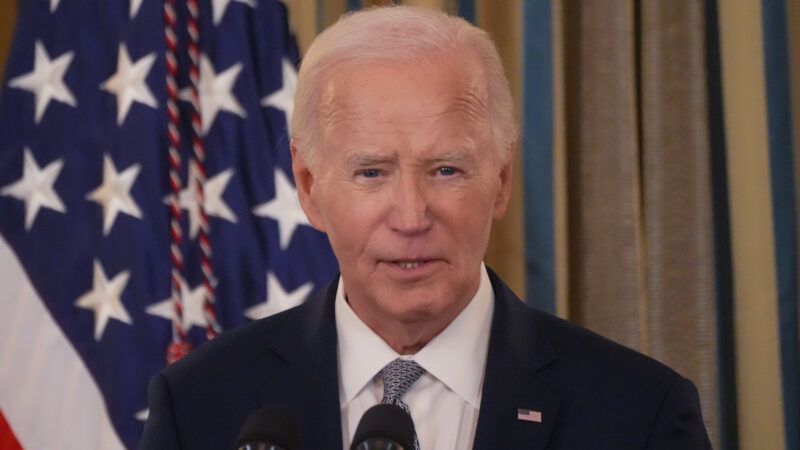Blocking the U.S. Steel Sale Is a Perfectly Disgraceful End to Biden's Political Career
It's a disgraceful decision that serves as a perfect epitaph for Biden's political career.

The decision to block U.S. Steel's acquisition by Nippon Steel is the perfect coda to President Joe Biden's political career.
By intervening in the private business affairs of the two companies, Biden is demonstrating once again his expansive view of executive power, hubristic sense of government's ability to order economic affairs, and willingness to stretch the definition of "national security" to justify his big government agenda even when there is plainly no national security threat.
Those elements have been central to Biden's political persona for decades. Even as his charisma and mental facilities have failed, they remain. From his earlier support for the drug war, the USA PATRIOT Act, and Obamacare to his administration's attempts at broad student loan forgiveness and inflation-inducing Bidenomics, Biden has rarely been deterred by norms or laws that limit federal power or by economic good sense. If there's something Biden wants to do, he'll simply find a way to do it.
Blocking Nippon's planned purchase of U.S. Steel is something Biden clearly wanted to do. He publicly opposed the deal soon after it was announced and indicated several times over the past few months that he was inclined to stop it. The only question was whether he'd be able to find a way to actually do it—and this is Biden, so that was never much of a question at all.
Officially, Biden says he's blocking the deal because there is "credible evidence" that the deal "threatens to impair the national security of the United States."
The official order signed by Biden laughably fails to detail any of that supposedly credible evidence, however. That's because it's ridiculous to suggest that Nippon Steel, a publicly traded company based in a close American ally (Japan) that already operates several steelmaking facilities in the United States, is any sort of threat.
Indeed, even the Committee on Foreign Investment in the United States (CFIUS), a shadowy entity created during the late stages of the Cold War to review potential economic threats to the country that's metastasized into an all-purpose mechanism for presidents to control American companies' deals with foreign firms, declined to label the deal a threat. In doing so, CFIUS left Biden to unilaterally block the deal, which he has now done.
It should also go without saying that this is a power that presidents ought not to have. The CFIUS process effectively gives presidents the final say over any foreign investment in the United States—and if it wasn't already apparent why that system needs serious reform, it should be obvious now. (Biden has also pushed to expand the CFIUS' power to scrutinize how Americans invest their money abroad, as Reason has reported.)
"It is my solemn responsibility as President to ensure that, now and long into the future, America has a strong domestically owned and operated steel industry that can continue to power our national sources of strength at home and abroad," Biden said in a statement on Friday.
If that were truly the impetus for this decision, then Biden would have stood aside. Nippon's agreement to buy U.S. Steel came with a promise to invest more than $1 billion in refurbishing and modernizing the company's existing plants. Local officials in Pennsylvania and elsewhere were enthusiastic about the deal's prospects to bring more jobs to steel towns that have experienced a long, slow decline despite the federal government's many efforts at propping up U.S. Steel with protectionism.
Biden's decision to block the deal is not a high-minded one rooted in the solemn responsibilities of an American president. It is a cynical, shallow decision that benefits a political ally—the bosses of the United Steelworkers union, which opposed the deal even though many rank-and-file members supported it—while ignoring the economic and constitutional harms.
It is, in short, a disgraceful decision. But, given the arc of Biden's political career and his relentless efforts to expand the scope of government power, it certainly isn't a surprising one.


Show Comments (59)